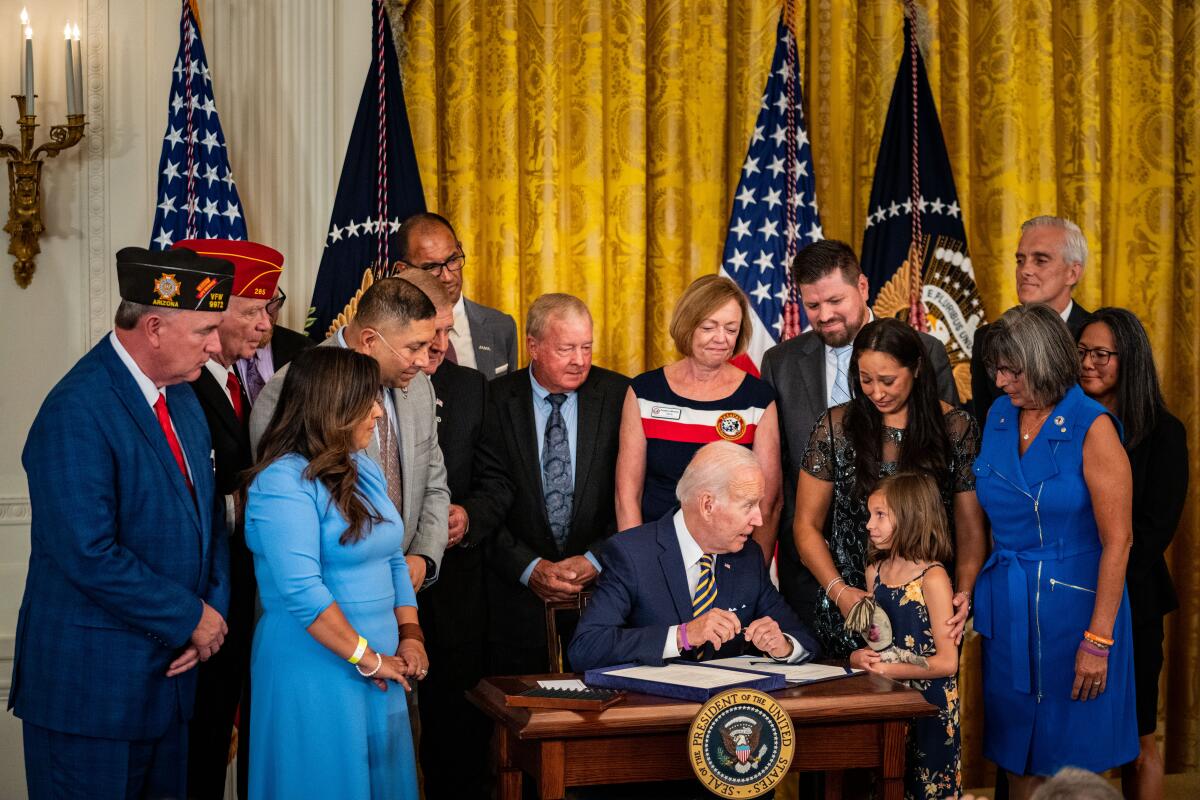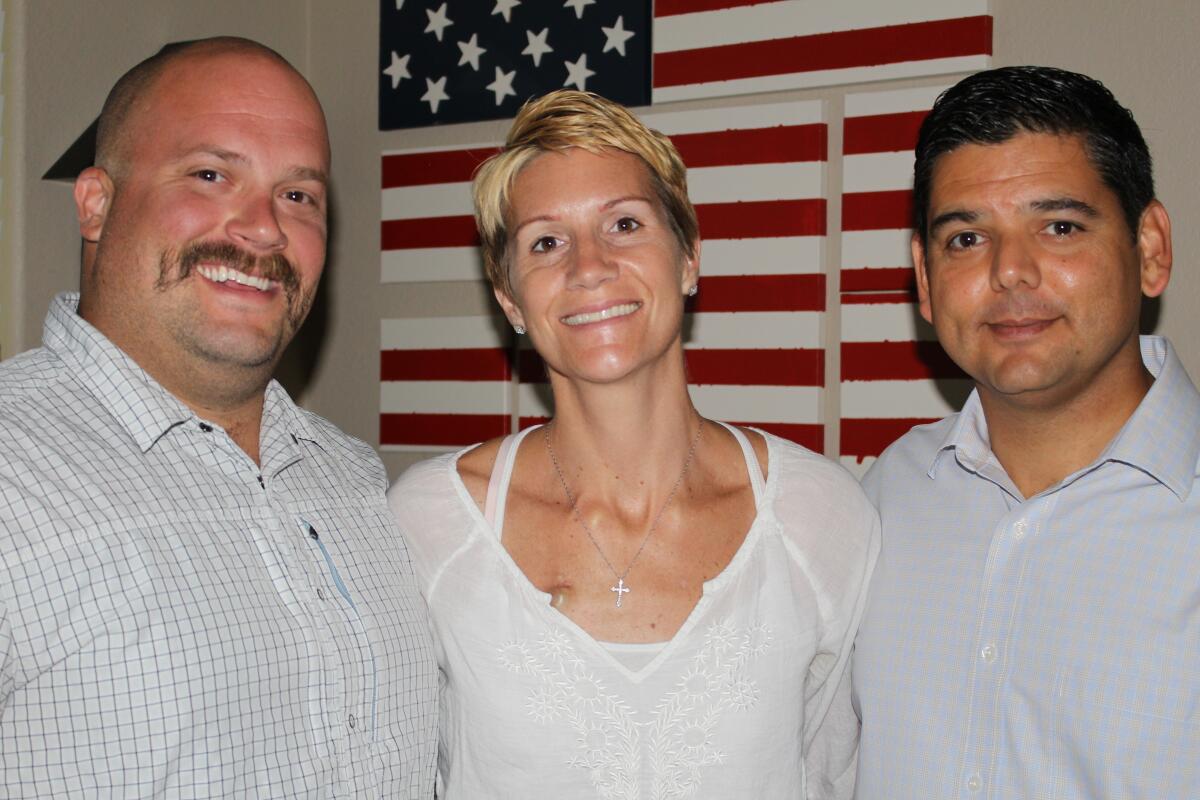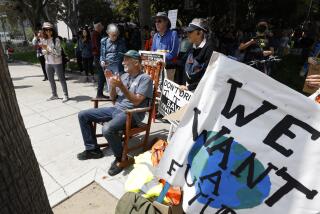How one California family helped win new benefits for sickened vets

- Share via
WASHINGTON — Jennifer Kepner seemed like one of the healthiest people you could meet. She ran, she did CrossFit and she worked at the local hospital in Cathedral City.
Then her back started to hurt.
Doctors found a mass on her pancreas. But they couldn’t figure out why someone so healthy would’ve come down with pancreatic cancer, which is extremely rare in young people, at age 37. Eventually, an oncologist pointed to the one red flag in Jennifer’s otherwise pristine medical history: her proximity to a burn pit while she served as an Air Force medic at Balad Air Force Base in Iraq.
As Jennifer’s health failed, the Department of Veterans Affairs rejected request after request for benefits to support her treatment and her family, including her husband Ben and their two young children. The Department of Defense uses burn pits like the one near Jennifer’s base to dispose of chemicals, cans, tires, plastics, medical equipment and human waste. But the Kepners couldn’t convince the agency that Jennifer’s sickness was due to breathing in the burn pit’s toxic fumes.

Enraged by the VA’s reticence, Jennifer’s friends and co-workers reached out to local media and the couple’s member of Congress, Rep. Raul Ruiz (D-Palm Springs), who worked as an emergency room doctor before he was elected to the House. In 2017, Ruiz met the Kepners at their kitchen table and vowed to ensure that their family, and families like them, receive the help they need.
Jennifer died Oct. 18, 2017, at the age of 37.
Shortly after Jennifer passed, the first check from the VA finally arrived at the Kepners home. “Her biggest fight was that she didn’t want other families to have to go through what we went through,” Ben Kepner told The Times. “It was a year-and-a-half battle while she was alive, dealing with her health, and then dealing with the VA as well. It was a year and a half of hell, with pretty much no help from the VA, which are the people that are supposed to take care of you. … That’s the last thing you want to deal with.”
After Jennifer’s death, Ben and Ruiz continued to work to ensure that other families don’t have to endure what she did.
On Wednesday, they celebrated a major victory as President Biden signed the $280-billion PACT Act into law at the White House. The measure directs the Veterans Affairs to presume that certain cancers and respiratory illnesses are related to burn pit exposure, allowing veterans to obtain disability payments without having to prove that their sickness is a result of their service, like the Kepners had to. One of the measures in the package, titled the Jennifer Kepner HOPE Act, will provide veterans exposed to burn pits eligibility for VA Healthcare.
“So many of you here today remind us that we have fought for this for so many years,” Biden said during the signing ceremony in the White House East Room. Biden’s elder son Beau died of cancer after deploying to Iraq. Beau “was lost to the same burn pits,” Biden said.
The new law removes the burden of proof that weighed down families like the Kepners, and was years in the making, Ruiz said. One of the primary hurdles he faced was a lack of definitive scientific proof to link illnesses with exposure to burn pits.
“There were hundreds of toxic chemicals, and there were known carcinogens, tested from the soils near the burn pits due to the smoke,” Ruiz said. “We do not have time for the 20-year double-cohort, longitudinal study to prove causality. … In this case, there was enough scientific suspicion and evidence in the literature and through the medical practice, that burn pits were causing a severe enough illness — people were dying, and still are — that we need to act on it.”
Six open-air burn pits remain in operation across Syria, Yemen, Iraq, Egypt and Chad, according to Ruiz’s office. Roughly 70% of disability claims related to burn pit exposure are denied by Veterans Affairs, which has cited a lack of evidence, scientific data and information from the Defense Department.
For the record:
7:17 a.m. Aug. 11, 2022An earlier version of this article misquoted Rep. Raul Ruiz (D-Palm Springs) as saying 8 million veterans and families would be helped by the PACT Act. He said 3 million.
“Over 3 million veterans and families will be positively impacted,” Ruiz, who authored several of the burn pit provisions, said of the new law. “Their pain and suffering will be reduced because they will have access to healthcare, and their widows and families will be taken care of because they will receive their benefits.”
The legislation, which the Senate approved 86-11 earlier this month, is considered to be the largest expansion of veterans healthcare in decades. Hundreds of thousands of Vietnam War-era veterans and survivors will also benefit from the new law. It adds hypertension, or high blood pressure, as a presumptive disease associated with Agent Orange exposure.
Senators had approved the legislation in June, but had to vote again this month to approve a technical fix. Senate Republicans then blocked the bill from advancing, saying they wanted to change another part of the legislation. The delay outraged veterans groups and advocates, including comedian Jon Stewart, many of whom camped out at the Capitol in protest.
Ruiz and Kepner said that the bill is just one step toward greater justice. Both aim to see the Department of Defense cease its practice of using burn pits altogether. In the most recent National Defense Authorization Act, Ruiz secured language that directs the agency to seek alternatives to burn pits.
“My wife kind of started the phrase, that it’s this generation’s Agent Orange, and it truly is,” Kepner said. “This bill means the world to not just me, but everyone going through what we went through. … They served their country and were exposed to ridiculous, harmful carcinogens. It’s just unacceptable.”
More to Read
Get the L.A. Times Politics newsletter
Deeply reported insights into legislation, politics and policy from Sacramento, Washington and beyond. In your inbox three times per week.
You may occasionally receive promotional content from the Los Angeles Times.











